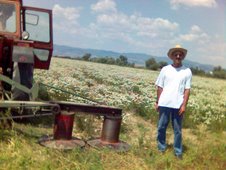LUXEMBOURG (Reuters) - EU ministers ended 18 months of squabbling on Tuesday over new rules for organic farming and came up with a labeling system that will tell consumers exactly what they are buying on the supermarket shelves.
ADVERTISEMENT
Farmers who sell produce containing at least 95 percent organic ingredients will use a special EU logo, along with a label to indicate the product's origin. Below that, there will be labeling of the organic ingredients present.
"This is an excellent agreement which will help consumers to recognize organic products throughout the EU more easily and give them assurances of precisely what they are buying," EU Agriculture Commissioner Mariann Fischer Boel said.
The labels can be accompanied by national and private logos, at the discretion of individual EU countries. Mass catering operations are excluded from the new rules although countries can choose to apply national rules if they wish.
Now, EU organic farmers have difficulty selling organic food in different EU countries as there is a patchwork of national and private logos that can be costly and complicated to obtain.
At present, the EU has two labeling categories: a "gold standard" where organic ingredients comprise at least 95 percent of the final product, and "emphasized labeling" where there is at least 70 percent organic material.
Although Europe saw its organic farming area jump nearly 70 percent in the late 1990s, growth has now slowed in several countries where it has reached a plateau.
In the 25 EU states, before the accession of Bulgaria and Romania, the amount of organic farmland stood at around 6.1 million hectares, or some 3.9 percent of total farm land.
But the average market share for organic products in the EU remains small at around two percent, with some exceptions such as vegetables at between five and 10 percent.
BIOTECH IN ORGANIC FOOD?
The main problem for many EU governments, and Europe's organic movement, was the issue of genetically modified (GMO) food -- specifically, the issue of setting an acceptable degree for the unavoidable presence of GMO material in organic farming.
The new law says products containing approved GMO material may not be labeled as organic, except those with up to 0.9 percent content of GMOs that are already authorized in the EU, via accidental or unavoidable contamination.
This is in line with current EU rules on biotech food and feed thresholds. It remains illegal to use GMOs in organic farming knowingly.
Fischer Boel has often said it would be too costly for farmers to achieve higher purity in their organic produce.
"We needed to clarify the rules on GMOs, to say they are not allowed in organic production. Before the agreement today, there were no limits. Everyone should know that we have tightened the rules," she told a news conference.
"It can be very tempting to say 'zero tolerance' but that wouldn't work in real life. To avoid accidental contamination it would be so expensive to produce organic products that it would damage the market completely. It would simply kill the sector."
Not all countries were impressed with the GMO provision.
"It is clear that this (GMO threshold) is not a license to contaminate. Any contamination would have to be involuntary and unavoidable," Austrian Agriculture Minister Josef Proell said.
"We cannot simply go on raising the threshold and pretend we are still on a path to organic farming," he told Reuters.
Environmental groups have been outraged by the idea, with one attacking it as the "thin end of a wedge which will allow the creeping contamination of organic food across Europe" and calling for cross-border EU laws to protect organic farmers.
"Now the EU has declared traces of genetic contamination in organic crops acceptable, organic farmers will find it increasingly difficult to keep their crops GM-free," said Helen Holder, GMO campaigner at Friends of the Earth Europe.
Tuesday, June 12, 2007
Subscribe to:
Comments (Atom)

